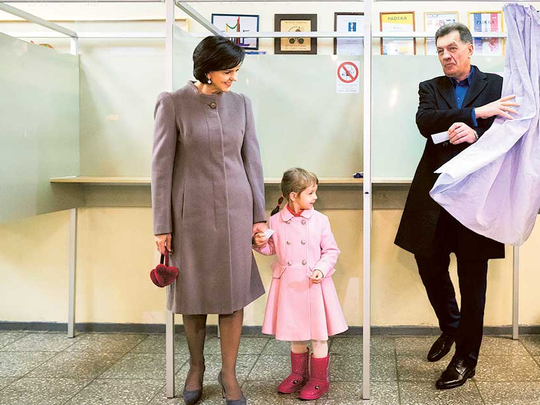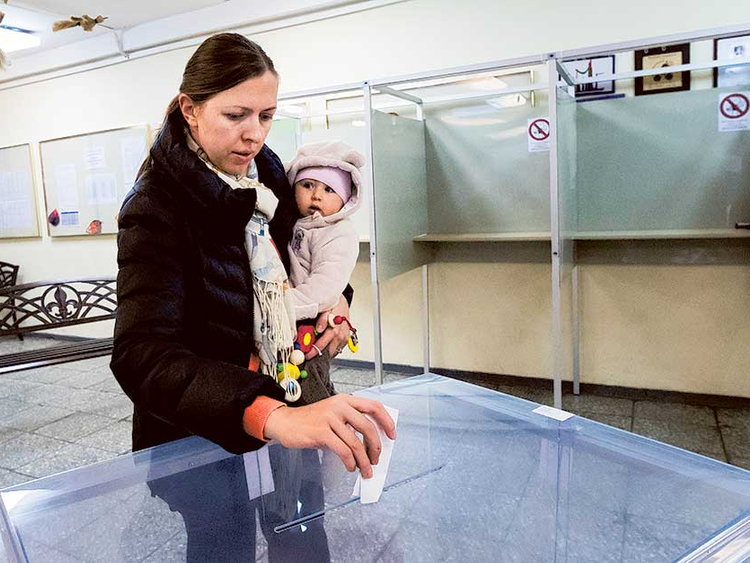
Vilnius: Lithuanians fed up with low wages and a labour exodus from their Baltic Eurozone state were voting on Sunday in a run-off election expected to dislodge the leftist government.
Tipped as the next prime minister, leader of the conservative Homeland Union Gabrielius Landsbergis has presented himself as the face of change.
The 34-year-old grandson of Lithuanian independence icon Vytautas Landsbergis has vowed to fight emigration by creating jobs, reforming education, boosting exports and foreign investment.
His conservatives won the October 9 first round of the election with 21.70 per cent (22 seats), narrowly ahead of the centrist Lithuanian Peasants and Green Union party (LPGU) with 21.53 per cent (21 seats).
Leftists finished third with just 14.42 per cent (10 seats), a huge blow for Prime Minister Algirdas Butkevicius’s Social Democrats.
Wage growth and job creation have been key rallying cries for candidates in the country of 2.9 million people, plagued by an exodus of workers seeking higher wages.
Since Lithuania joined the European Union (EU) in 2004, an estimated 370,000 people have left — nearly half to Britain, where concern over immigration from eastern Europe was seen as a key factor in the shock Brexit vote to leave the bloc.
Landsbergis has garnered support among disillusioned voters like Vilnius businessman Linas Bagiusis.
“I want change. We need new ideas and new energy, especially to curb emigration and stop all the young people from fleeing,” he told AFP on Sunday outside a polling station in central Vilnius.
Prime Minister Butkevicius for his part has promised further hikes in the minimum wage and public sector salaries.
But analysts say a new labour law making it easier to hire and fire employees, coupled with allegations of political corruption, have alienated voters already bitter over low wages and the labour exodus to western Europe.
Pensioner Genovaite, whose grandson is studying in Britain, said Landsbergis and his party’s promise to curb the brain drain and labour exodus got her vote.
“To stop emigration, you need to create jobs that will keep specialists here, at home,” she said in central Vilnius, but declined to reveal her surname.
Lithuania’s economy shrank by nearly 15 per cent during the 2008-9 global financial crisis but quickly recovered and is slated to expand by 2.5 per cent this year.
Even so, the average wage of just over €600 (Dh2,399) per month after tax is one of the EU’s lowest, and inequality and poverty remain comparatively high.
Analysts tip the farmer-backed LPGU — currently outside parliament and led by popular former national police chief Saulius Skvernelis — as kingmakers after the vote.
Skvernelis, 46, has said his party was open to coalition talks with both the conservatives and the Social Democrats.
Three other small political parties entered parliament in round one, signalling complicated coalition talks in the days ahead.
With the Homeland Union and LPGU likely to stay neck-and-neck in round two, Vilnius University analyst Mazvydas Jastramskis points to a possible impasse ahead.
“It won’t be good if both parties win equal voter support. Both will want to spearhead talks” to lead the next government, he told AFP.
But he added that non-aligned President Dalia Grybauskaite could “invite certain party leaders she would like to see in the coalition to the negotiating table.”
Grybauskaite has criticised Butkevicius while making it known she favours “changes”.
Russia’s deployment earlier this month of nuclear-capable Iskander missiles to its Kaliningrad exclave two weeks ago jangled nerves in neighbouring Lithuania.
But reassurance provided by Nato’s beefed-up regional presence — a move that all major parties approve — means that voters are more worried about their wallets than security.
Sixty-eight of the 141 seats in parliament are up for grabs on Sunday, with the balance filled in round one.
A total of 2.5 million citizens are eligible to vote. Officials pegged turnout at 50.6 per cent in round one.
Polls close at 1700 GMT, with an early indication of the victors expected within hours.













